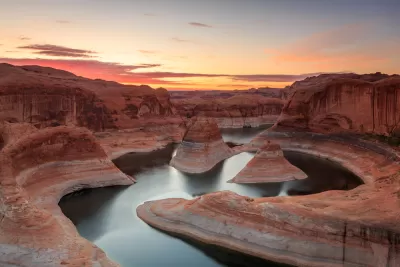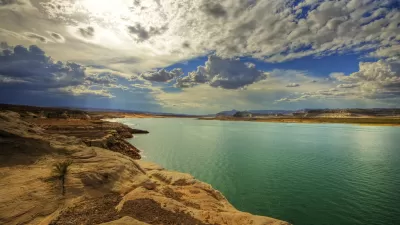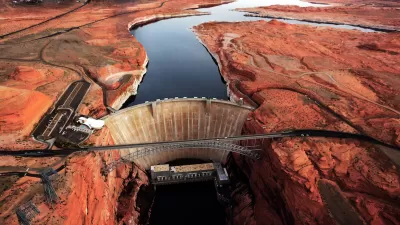Record low water levels are sinking Lake Powell's houseboat industry as climate change threatens water supplies in the West.

Historically low water levels in Lake Powell, the reservoir formed by the Glen Canyon Dam and one of the Southwest's biggest water sources and recreational destinations, is disrupting the recreational industry in the area and threatening water supplies, reports Annette McGivney in the Guardian. "The National Park Service abruptly announced earlier this month that houseboats could no longer use the Wahweap Launch Ramp, the busiest boat launch site in the area. Boats already cast out into the water were warned they had less than a week to return to land, or risk getting marooned."
The lake's water line recently "reached a historic low of 3,554ft, a level that has not been seen since 1969, when the reservoir was first filled. The giant reservoir is currently three-quarters empty and will keep dropping at least through next spring due to record low snowpack levels in the Colorado River basin." Of seven public boat launch ramps, just one remains reliably operational. "But that too may soon become inaccessible."
Meanwhile, "[a]s water managers and the Park Service scramble to adapt an infrastructure that was designed to function optimally when Lake Powell was full – which last happened in 1999 – some environmentalists are fighting to protect the nearly 100,000 acres of land that has emerged from beneath the high water mark." Eric Balken, executive director of the Glen Canyon Institute, says houseboating is just one of many recreational options people can access as the water line drops and Glen Canyon–vividly captured in Edward Abbey's seminal book Desert Solitaire–reemerges from the depths. "We are not anti houseboat, we are just pro-Glen Canyon," says Balken. "We want the ecological values of Glen Canyon to be part of the discussion about how to move forward during climate change."
FULL STORY: ‘Climate change has become real’: extreme weather sinks prime US tourism site

Trump Administration Could Effectively End Housing Voucher Program
Federal officials are eyeing major cuts to the Section 8 program that helps millions of low-income households pay rent.

Planetizen Federal Action Tracker
A weekly monitor of how Trump’s orders and actions are impacting planners and planning in America.

Ken Jennings Launches Transit Web Series
The Jeopardy champ wants you to ride public transit.

Washington Legislature Passes Rent Increase Cap
A bill that caps rent increases at 7 percent plus inflation is headed to the governor’s desk.

From Planning to Action: How LA County Is Rethinking Climate Resilience
Chief Sustainability Officer Rita Kampalath outlines the County’s shift from planning to implementation in its climate resilience efforts, emphasizing cross-departmental coordination, updated recovery strategies, and the need for flexible funding.

New Mexico Aging Department Commits to Helping Seniors Age ‘In Place’ and ‘Autonomously’ in New Draft Plan
As New Mexico’s population of seniors continues to grow, the state’s aging department is proposing expanded initiatives to help seniors maintain their autonomy while also supporting family caregivers.
Urban Design for Planners 1: Software Tools
This six-course series explores essential urban design concepts using open source software and equips planners with the tools they need to participate fully in the urban design process.
Planning for Universal Design
Learn the tools for implementing Universal Design in planning regulations.
Heyer Gruel & Associates PA
Ada County Highway District
Institute for Housing and Urban Development Studies (IHS)
City of Grandview
Harvard GSD Executive Education
Toledo-Lucas County Plan Commissions
Salt Lake City
NYU Wagner Graduate School of Public Service





























